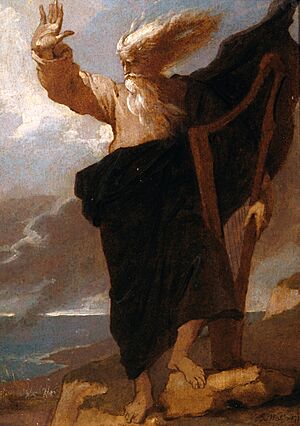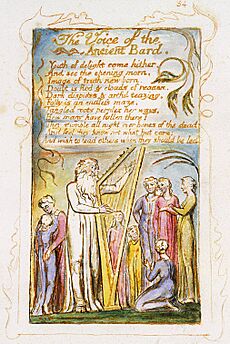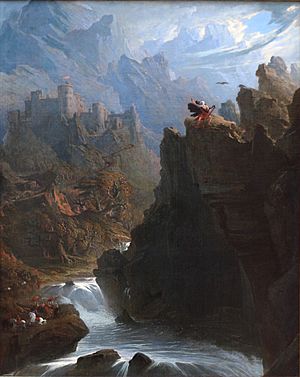Bard facts for kids

A bard was a special kind of storyteller, poet, and musician in ancient Celtic cultures. They were like living history books! Bards worked for important leaders, like kings or chiefs. Their job was to remember and share stories about the leader's family and brave deeds. They did this through poems, songs, and stories.
Over time, the idea of a bard changed. Today, the word "bard" can mean any famous poet or writer. For example, William Shakespeare is often called "the Bard of Avon." In the past, especially in 16th-century Scotland, the word sometimes meant a traveling musician. But later, writers like Sir Walter Scott made the idea of a bard seem exciting and important again.
Contents
Where the Word "Bard" Comes From
The word "bard" comes from ancient Celtic languages. It's a very old word! In languages like Gaulish and Welsh, words similar to "bard" meant "poet" or "singer."
Long ago, the word bardos meant "poet-singer." It's believed to have come from an even older word that meant "praise-maker." This shows that bards were always known for their ability to create beautiful words and songs.
The Role of Bards in History
Bards were very important people in ancient Celtic cultures. They were like special poet-musicians. Their main job was to create and sing poems, often with a harp. These songs celebrated the brave actions of leaders and warriors.
Bards also kept track of history. They remembered important facts, traditions, laws, and family trees. Since many Celtic people didn't write things down, bards were the living memory of their communities. They used rhythm, rhyme, and other poetic tricks to help them remember everything.
In places like Ireland and Wales during the Middle Ages, bards were professional poets. They worked for lords and chiefs. They would write poems praising their leaders. If a leader didn't treat them well, a bard might even write a clever, critical poem! Other cultures had similar roles, like skalds in Norse lands or minstrels.
Bards in Ireland
In medieval Ireland, bards were skilled poets. They often came from families where poetry was passed down through generations. These bards knew a lot about their clan's history and traditions. They were experts in creating poems with special rhythms and sounds.
Bards worked for kings and chiefs. They acted as official historians and praise-singers. They would celebrate their leaders and sometimes even criticize those who opposed them. People believed a bard's powerful words could have a strong effect!
The bardic tradition in Ireland continued until the mid-1600s. It was closely tied to the Irish noble families. When these families lost power, the bards' role also changed.
Ancient Irish stories, like the Book of Invasions, mention bards. One legend tells of the Tuatha Dé Danann, an ancient group in Ireland. In this story, the Danann tribe were the bards. A famous bard from Irish myths was Amergin Glúingel. He was also a wise leader and judge.
Bards in Scotland
In Scotland, one famous family of bards was the MacMhuirich family. They were active from the 1400s to the 1700s. This family lived in the Hebrides islands. They believed their family came from an Irish bard who moved to Scotland long ago.
The MacMhuirich family worked for powerful leaders, like the Lords of the Isles. They served as poets, legal advisors, and even doctors. After the Lords of the Isles lost power, the family worked for the MacDonalds of Clanranald.
The last known bard from this family to write traditional Gaelic poetry was Domhnall MacMhuirich in the 1700s. In some Gaelic-speaking areas, there were also "village bards." These were local poets who wrote about their community in a traditional style.
Bards in Wales
Many stories about bards from Welsh mythology appear in old Welsh books. Famous bards like Aneirin and Taliesin might have been real poets from the 500s and 600s. The old Welsh laws, created around the year 900, said that a bard was an important part of a king's household.
The tradition of royal bards ended in the 1200s. This happened when the Welsh princes lost their rule. A famous poem called The Bards of Wales tells a legendary story about "The Last Bard." This poem was written by a Hungarian poet in 1857. It used the story to talk about freedom and standing up to unfair rulers.
Even after the royal bards, Welsh poetry and music continued to thrive. Poets like Dafydd ap Gwilym kept the traditions alive. Today, Wales still celebrates its bardic heritage. The annual National Eisteddfod of Wales is a big festival where poets compete. Winners are honored as "chaired bards" or "crowned bards." Many schools also hold their own smaller festivals to keep these traditions alive.
Famous Bards in Literature

Over time, the title "The Bard" became a special nickname for many famous poets:
- 'The Bard of Armagh' is Martin Hearty.
- 'The Bard of Avon' or simply 'The Bard' is William Shakespeare.
- 'The Bard of Ayrshire' is Robert Burns.
- 'The Bard of Bengal' is Rabindranath Tagore.
- 'The Bard of Olney' is William Cowper.
- 'The Bard of Rydal Mount' is William Wordsworth.
- 'The Bard of Salford' is John Cooper Clarke.
- 'The Bard of Twickenham' is Alexander Pope.
- 'The Bard of the Yukon' is Robert W. Service.
- Australian bush poets like Henry Lawson and Banjo Paterson are called 'bush bards'.
- Modern musicians like Bob Dylan and the band Blind Guardian have also been called 'bards'.
See also
 In Spanish: Bardo para niños
In Spanish: Bardo para niños
- Aois-dàna
- Bard (Dungeons & Dragons)
- Bard (League of Legends)
- Bard (Soviet Union)
- Bhāts
- Cacofonix
- Charan (India)
- Contention of the bards
- Druid
- Fili
- Gorsedd
- Gorseth Kernow (Cornwall)
- Griot
- Gusans
- Minstrel
- Poet as legislator
- Rhapsodist
- Skald
- The Bards of Wales
- The Bard's Tale (1985 video game)
- Troubadour
- Vates
- Welsh bardic music
- Kobzar
- Duma (epic)
- Lirnyk
 | Emma Amos |
 | Edward Mitchell Bannister |
 | Larry D. Alexander |
 | Ernie Barnes |



